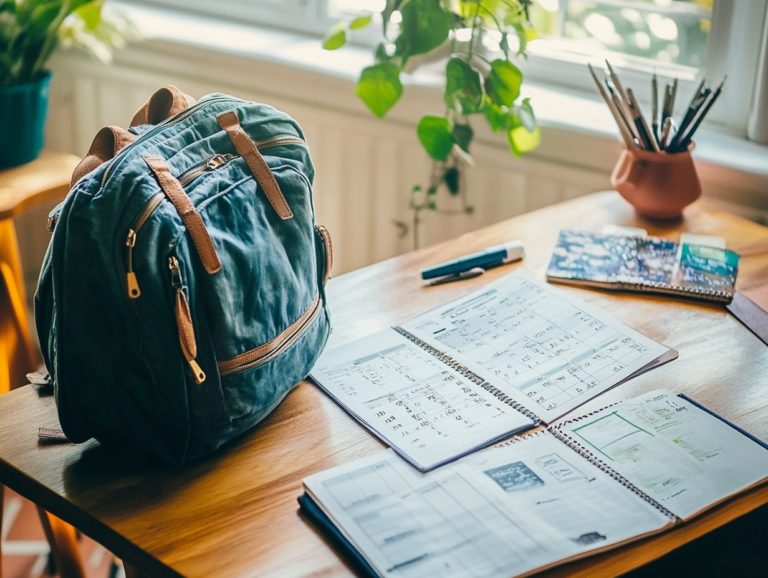what to do the week before the test?
As the countdown to your test begins, the week before can feel quite overwhelming. To set yourself up for success, it s essential to establish a solid study routine, gather the necessary materials, and create an effective plan tailored to your specific needs.
This guide presents key strategies for studying, managing anxiety, and executing last-minute reviews. By adopting the right approach, you ll not only boost your confidence but also deepen your understanding of the material. Prepare yourself to tackle that test head-on!
Contents
- Key Takeaways:
- Preparing for a Test: A Week Before
- Effective Study Techniques
- Managing Test Anxiety
- Last Minute Review Strategies
- Frequently Asked Questions
- What should I do the week before a test?
- Is it important to review all of my notes the week before a test?
- What role does sleep play in preparing for a test?
- Should I try to fit in extra studying the week before a test?
- What about studying with friends or in a group?
- Should I change my diet leading up to a test?
Key Takeaways:

- Prioritize studying by setting a schedule and gathering materials a week before the test.
- Utilize effective study techniques such as practice tests, flashcards, and note-taking to prepare for the test.
- Combat test anxiety by identifying and addressing it, and incorporating relaxation techniques into your study plan.
Preparing for a Test: A Week Before
Preparing for a test just a week in advance is pivotal for laying the groundwork for success on exam day. This period is essential for crafting a structured timetable that allows you to dedicate ample time to study various subjects, engage with practice materials, and implement effective study strategies.
By focusing on revision techniques and ensuring a comprehensive preparation plan, you can build your confidence and elevate your academic performance. Remember to balance study sessions with rest. This approach prevents burnout and maximizes your content retention, ensuring you achieve optimal results in your school exams.
Setting a Study Schedule
A study schedule is the backbone of effective preparation, ensuring you allocate specific time slots for focused studying and revision sessions. By planning your time strategically, you can weave different subjects into your daily routine, allowing for a balanced approach to learning.
Carve out dedicated practice sessions for challenging topics. This not only solidifies your understanding but also promotes long-term retention. Incorporate regular breaks to enhance your mental clarity, enabling you to return refreshed and ready to tackle the material.
With a strong emphasis on time management, you ll enhance your ability to concentrate and grasp complex concepts, leading to a fruitful study experience. A well-crafted schedule fosters discipline and nurtures a mindset geared toward academic success.
Gathering Study Materials
Gathering the right study materials is key to efficient preparation, encompassing everything from textbooks to online resources tailored to your curriculum. These materials shape your learning experience, facilitating a deeper understanding and retention of key concepts.
Textbooks provide structured content aligned with educational standards. Online resources offer interactive tools and multimedia that simplify complex topics. Study guides become invaluable allies in your revision, summarizing essential points and highlighting crucial details that aid in exam preparations.
Investing in high-quality materials enhances your grasp of the subjects and cultivates a more engaging and effective study routine.
Creating a Study Plan
Creating a study plan is essential for your exam preparation process. It lays out specific strategies for engaging with content and maximizing your study efficiency. Break down the syllabus into manageable sections and employ techniques like retrieval of information from memory and revisiting material at timed intervals to boost retention.
Engagement techniques, such as quizzes or teaching concepts to peers, reinforce your understanding. Incorporate periodic revision sessions to ensure you truly retain what you learn. Track your performance in practice tests and adjust your plan as needed. Following this plan can lead to better test scores, helping you stay motivated and firmly on the path to success.
Effective Study Techniques

Mastering content starts with effective study techniques. These techniques encompass a diverse range of methods, each thoughtfully tailored to your unique learning style.
By embracing these strategies, you can enhance your understanding and retention, paving the way for remarkable academic success.
Practice Tests and Quizzes
Using practice tests and quizzes is an incredibly effective strategy for your exam preparation. These tools closely mimic actual exam conditions and help you gauge your understanding of the material.
Incorporating them into your study routine helps you get used to the exam format and timing, while also allowing you to identify your strengths and weaknesses.
Engaging with these practice assessments can boost your confidence by providing immediate feedback, reinforcing your knowledge and clarifying concepts that may have been previously misunderstood.
After each quiz, take the time to analyze your results. This will pinpoint specific areas needing further attention and enable you to develop targeted study strategies.
This focused approach ensures your study time is both efficient and effective, maximizing your potential for success in any upcoming test.
Flashcards and Note-taking
Flashcards and effective note-taking are invaluable tools for enhancing your memorization and retention during study sessions. They allow you to actively engage with the material.
By employing these techniques, you can transform passive reading into a dynamic learning experience. To craft effective flashcards, include clear, concise information paired with relevant images to enhance visualization.
Note-taking methods, like dividing your paper into sections, can help you organize your thoughts logically, fostering a deeper understanding of the subject matter.
Regularly revisiting those flashcards during revision solidifies your memory pathways, making retrieval during exams a breeze. Establishing a consistent routine around these strategies boosts your confidence and improves your overall academic performance.
Managing Test Anxiety
Managing test anxiety is crucial for your success! Stress can profoundly affect your ability to concentrate and retain information, making it vital to develop strategies that help you navigate these challenges effectively.
Identifying and Addressing Anxiety
Identifying and addressing anxiety is your first step toward effective management. Being aware of it allows you to implement techniques that significantly reduce your stress levels during preparation.
This awareness may reveal itself through various physical and emotional symptoms, such as restlessness, fatigue, and difficulty concentrating. Recognizing these signs is crucial; it gives you the power to take proactive measures.
Seeking support from peers, teachers, or counselors can provide a vital sounding board. Practicing self-care techniques, like mindfulness, regular exercise, and proper nutrition, can greatly enhance your overall well-being.
By incorporating these strategies into your study routine, you learn to cope with anxiety and foster a healthier, more productive academic environment.
Relaxation Techniques

Incorporating relaxation techniques into your study routine significantly eases stress and enhances your mental health, allowing for a more focused approach to exam preparation.
These techniques reduce anxiety and boost your well-being, elevating your overall performance.
Deep breathing exercises boost oxygen circulation, bringing clarity of thought and a sense of tranquility.
Progressive muscle relaxation targets physical tension, prompting your body to release stress and achieve a more receptive mental state.
Mindfulness exercises develop present-moment awareness, sharpening your concentration and minimizing distracting thoughts.
By weaving these practices into your routine, you can establish a healthier balance between study and relaxation, leading to more effective learning outcomes.
Last Minute Review Strategies
Implementing last-minute review strategies is essential for reinforcing key concepts and ensuring that the most critical material remains fresh in your mind before the exam.
This focused approach enables you to consolidate your understanding and maximize retention, setting you up for success when you face that test.
Prioritizing Key Concepts
Prioritizing key concepts during last-minute reviews enhances your chances of success. Focus your efforts on the most critical areas that are likely to appear on your exams.
You can effectively identify these essential topics by skimming through your notes and pinpointing recurring themes, definitions, or concepts that your instructors have emphasized. Using methods like active recall a technique where you test your memory by trying to remember information without looking at your notes will greatly enhance your memory retention.
Crafting flashcards or summarizing chapters in your own words are excellent ways to solidify your understanding of the material. Forming study groups is also beneficial; it encourages discussion, clarifies uncertainties, and broadens your perspectives on the topics at hand.
By focusing on these methods during your final review sessions, you ll walk into your exams prepared and ready to shine!
Effective Memorization Techniques
Effective memorization techniques are your best allies during those last-minute reviews, helping you solidify your understanding and recall of vital information.
By employing methods like spaced repetition, where you revisit material at increasing intervals, you can significantly enhance your long-term retention of facts.
Incorporating mnemonics those clever memory aids can transform complex information into vivid images or catchy phrases, making them much easier to remember.
Engaging in active recall, where you test yourself on the material instead of just passively reviewing it, creates stronger neural connections in your brain.
Using these strategies in a well-organized study session helps boost your confidence and retention rates, making the learning process not only more effective but also much more manageable.
Frequently Asked Questions
What should I do the week before a test?

The week before a test is crucial for preparation. Here are some things you should do to ensure success:
- Create a study schedule and stick to it
- Review all notes and materials from class
- Practice with past tests or quizzes
- Get enough rest and exercise
- Eat healthy and stay hydrated
- Don’t cram the night before; instead, try to relax and get a good night’s sleep
Is it important to review all of my notes the week before a test?
Yes, it is important to review all of your notes from class the week before a test. This will refresh your memory and help you identify any areas that you may need to focus on more.
What role does sleep play in preparing for a test?
Sleep is crucial for both overall health and for preparing for a test. Aim for at least 8 hours of sleep each night before the test for optimal focus.
Should I try to fit in extra studying the week before a test?
It is important to maintain a balance between studying and taking breaks. While it may be tempting to study as much as possible the week before a test, it is also important to give your brain rest. Take breaks, exercise, and get enough sleep to keep your mind and body refreshed.
What about studying with friends or in a group?
Studying with friends or in a group can be helpful, as long as it is productive. Make sure to set a specific study topic or goal and stick to it. Avoid getting off track and use this time to quiz each other or discuss important concepts.
Should I change my diet leading up to a test?
Eating a balanced and nutritious diet is always important, but especially during times of high stress, like before a test. Make sure to incorporate plenty of fruits, vegetables, and proteins into your meals. Avoid consuming excess sugar and caffeine, as they can cause crashes and interfere with sleep.






